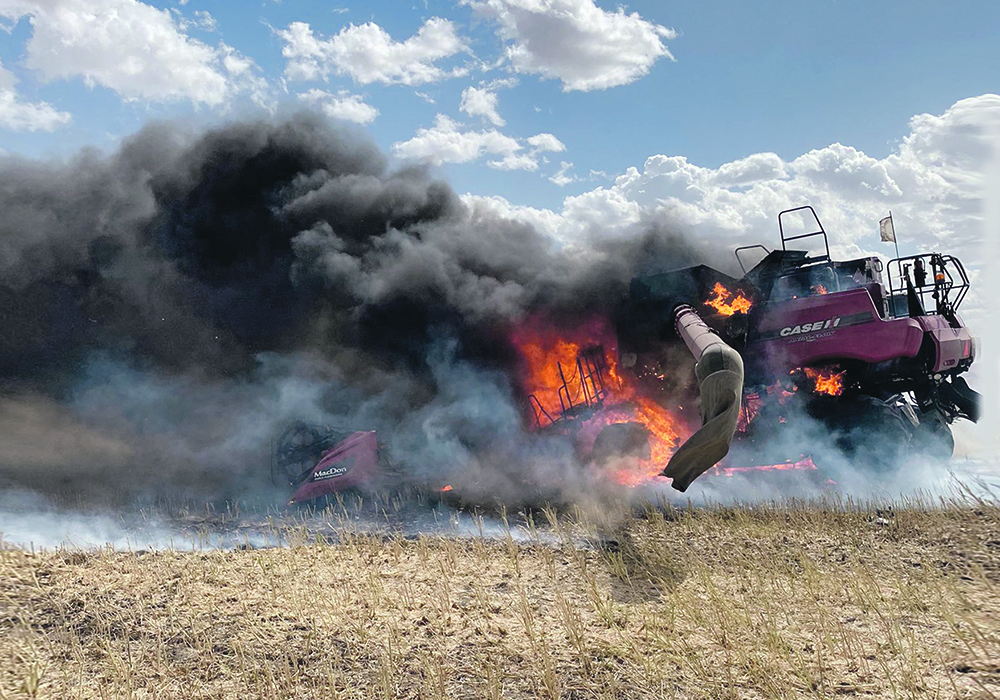Gracie LeBlanc’s first season in her own combine could be considered baptism by fire.
On Sept. 2, the 13-year-old was harvesting canola on the family farm near Estevan, Sask., when one of the others in the field noticed little fires smouldering.
Her dad, Jason, said it was obvious one of the combines was dropping something to start the fires so the grain cart operator drove behind them all and discovered it was the one Gracie was driving.
“I said, ‘Gracie, you need to stop,’ ” Jason said during an interview a day later. “I took off over there in the truck and I pulled up behind her and you could see the fire. The last thing I said before I got out of the truck was, ‘get out of the cab now. Get out.’ ”
Read Also

Farming Smarter receives financial boost from Alberta government for potato research
Farming Smarter near Lethbridge got a boost to its research equipment, thanks to the Alberta government’s increase in funding for research associations.
Gracie didn’t even shut off the combine before she was on the ground beside her dad. Fire extinguishers were no match for the fire.
“Her whole cab was an inferno,” in less than a minute Jason said. “It was just unbelievable how fast that went.”
Gracie said she didn’t know her combine was on fire.
“My fan speed was low and I kind of smelled smoke,” she said, but she couldn’t see it. “Everyone yelled at me to get out. It was pretty scary.”
She had a small cry but Jason said they had fires to put out so she couldn’t do that for long.
“I said, ‘get a shovel; we got to go. There’s fires all over the field here.’ ”
The LeBlanc fire is one of many that have occurred over the parched Prairies this fall. Numerous combines have gone up in flames, particularly while harvesting lentils.
Assiniboia, Sask., fire chief Chuck Rust said his department has responded to just a single one as a brigade, but there have been several that farmers have put out by themselves and with neighbours. Some say at least a dozen combine fires have occurred already in the area.
“We’re not usually called unless it gets really bad,” he explained.
But he knows of several combines, a baler, a tractor and field fires in the southwest region. He heard of one farmer who didn’t know he was on fire until someone driving by noticed and alerted him.
“It’s a little worse than normal because it’s just so dry,” Rust said.
He said farmers always have water and discs nearby when harvesting because fire is always a possibility.
In the Medicine Hat, Alta., area there were at least seven combine fires in the last part of August. At least two have gone up around Regina.
Tory Campbell at Roblynn Farms Ltd. at Coaldale, Alta. said they had a close call recently when a chopper bearing on the combine blew out, sparking and lighting the stubble on fire. Fortunately, they had an extinguisher handy and were able to put the fire out quickly.
“We always try and have a disc and a water truck in the field,” Campbell said via Twitter. “Always stressful to see smoke in the distance.”
Social media has been full of pictures and reports of machinery fires.
Jason LeBlanc said farmers in his area started a group chat a few years ago called FIRE. Anyone who has a fire or an emergency contacts the group, which now includes about 40 people.
Combine in 70k winds and things can go wrong in a hurry. My daughter escaped this today as the cab was engulfed immediately. So thankful to have great neighbours that brought discs and water trucks, with in minutes, because of our community what’s app. #2020worstyear pic.twitter.com/BPXa3QB8uS
— Jason LeBlanc (@jasonauctioneer) September 2, 2020
He texted the group last week and within 10 minutes the first water tank had arrived.
They ended up with six discs, two graders from the rural municipality, three or four semis of water plus the LeBlanc’s own firefighting equipment. By the time the fire department arrived they had the flames pretty much out.
“I was thankful they came,” he said, adding the members sprayed foam and made sure all the hotspots were taken care of.
LeBlanc figures a fuel line ruptured on his Case combine, an older model worth about $250,000, to cause the fire.
“It was spraying something out,” he said. “I thought it was an oil line gone, but it might have been the fuel pump.”
The combine is a total loss so it’s hard to tell, however. The family typically runs five combines but will go ahead with four.
Gracie, who started Grade 9 this week, didn’t get much of a break, getting into her sister’s combine at 7:30 the next morning.
Her dad said she’s a good operator who sets the combine herself and understands the mechanics of the machine.
“I like it,” Gracie said of combining. “When it’s not on fire.”


















